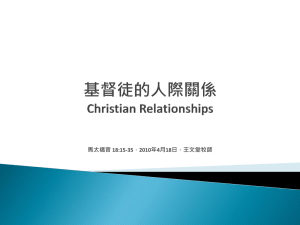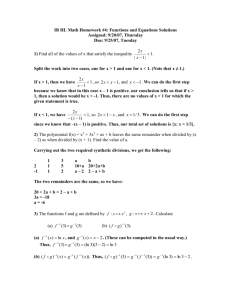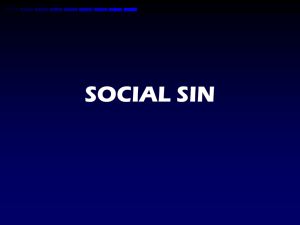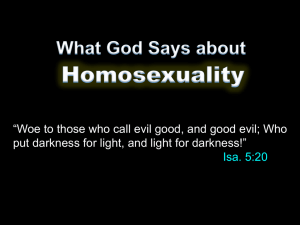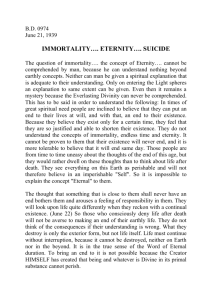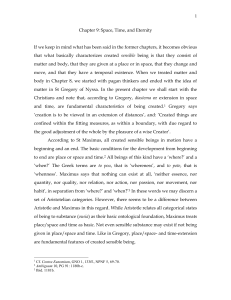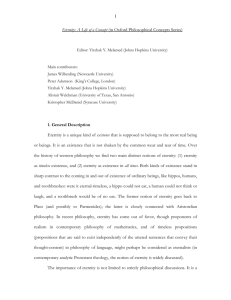Introitus to Sentences
advertisement
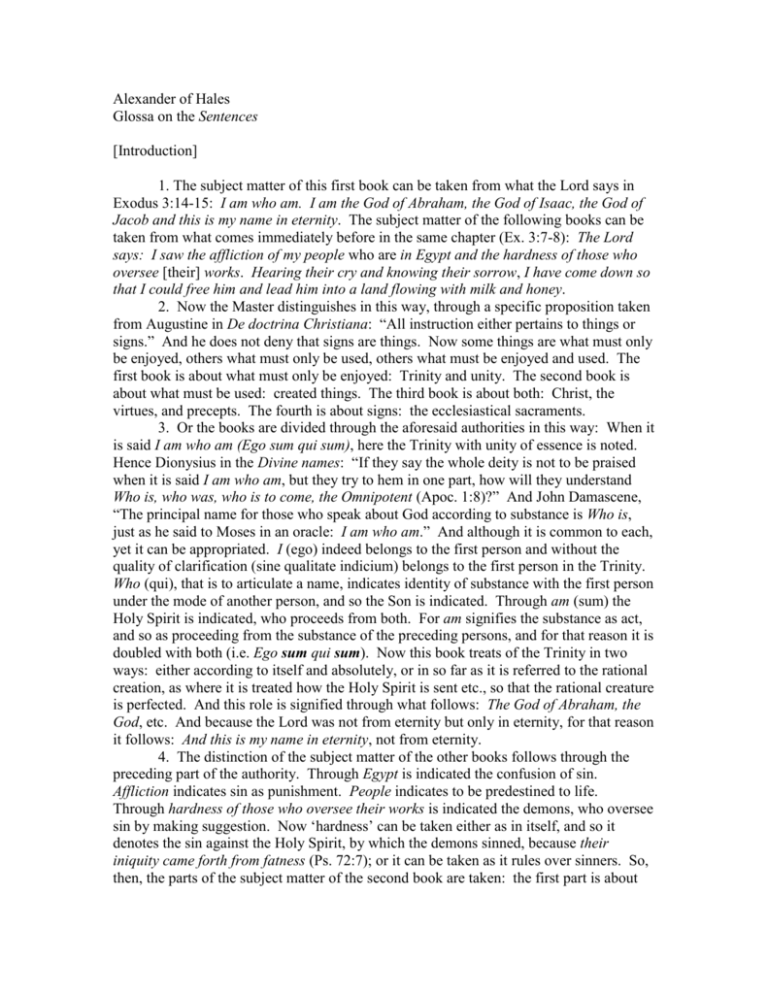
Alexander of Hales Glossa on the Sentences [Introduction] 1. The subject matter of this first book can be taken from what the Lord says in Exodus 3:14-15: I am who am. I am the God of Abraham, the God of Isaac, the God of Jacob and this is my name in eternity. The subject matter of the following books can be taken from what comes immediately before in the same chapter (Ex. 3:7-8): The Lord says: I saw the affliction of my people who are in Egypt and the hardness of those who oversee [their] works. Hearing their cry and knowing their sorrow, I have come down so that I could free him and lead him into a land flowing with milk and honey. 2. Now the Master distinguishes in this way, through a specific proposition taken from Augustine in De doctrina Christiana: “All instruction either pertains to things or signs.” And he does not deny that signs are things. Now some things are what must only be enjoyed, others what must only be used, others what must be enjoyed and used. The first book is about what must only be enjoyed: Trinity and unity. The second book is about what must be used: created things. The third book is about both: Christ, the virtues, and precepts. The fourth is about signs: the ecclesiastical sacraments. 3. Or the books are divided through the aforesaid authorities in this way: When it is said I am who am (Ego sum qui sum), here the Trinity with unity of essence is noted. Hence Dionysius in the Divine names: “If they say the whole deity is not to be praised when it is said I am who am, but they try to hem in one part, how will they understand Who is, who was, who is to come, the Omnipotent (Apoc. 1:8)?” And John Damascene, “The principal name for those who speak about God according to substance is Who is, just as he said to Moses in an oracle: I am who am.” And although it is common to each, yet it can be appropriated. I (ego) indeed belongs to the first person and without the quality of clarification (sine qualitate indicium) belongs to the first person in the Trinity. Who (qui), that is to articulate a name, indicates identity of substance with the first person under the mode of another person, and so the Son is indicated. Through am (sum) the Holy Spirit is indicated, who proceeds from both. For am signifies the substance as act, and so as proceeding from the substance of the preceding persons, and for that reason it is doubled with both (i.e. Ego sum qui sum). Now this book treats of the Trinity in two ways: either according to itself and absolutely, or in so far as it is referred to the rational creation, as where it is treated how the Holy Spirit is sent etc., so that the rational creature is perfected. And this role is signified through what follows: The God of Abraham, the God, etc. And because the Lord was not from eternity but only in eternity, for that reason it follows: And this is my name in eternity, not from eternity. 4. The distinction of the subject matter of the other books follows through the preceding part of the authority. Through Egypt is indicated the confusion of sin. Affliction indicates sin as punishment. People indicates to be predestined to life. Through hardness of those who oversee their works is indicated the demons, who oversee sin by making suggestion. Now ‘hardness’ can be taken either as in itself, and so it denotes the sin against the Holy Spirit, by which the demons sinned, because their iniquity came forth from fatness (Ps. 72:7); or it can be taken as it rules over sinners. So, then, the parts of the subject matter of the second book are taken: the first part is about the rational creature entirely spiritual, fallen irredeemably into sin, suggesting to another continually that he sin. The second part is about the creature partially spiritual, fallen redeemably into sin; which is indicated through people, by which predestination is designated. Of this affliction it is found in Isaiah 52:4-6: My people went down into Egypt at the beginning to sojourn there: and the Assyrian oppressed them without any cause at all. They that rule over them treat them unjustly, and my name is continually blasphemed all the day long. Therefore my people shall know my name: for I myself that spoke, behold I am here. Behold the subject matter of the second book. 5. The subject matter of the third book is taken from what follows. Three verbs are offered there: I saw, I heard and knowing. Sight is received through something completely extrinsic; hearing through something partially intrinsic and less remote: for the air, the medium of hearing, enters into the instrument; knowledge is completely interior. Through this the greater and greater compassion moving God to free the human race is indicated. The depth of compassion follows upon the depth of sin and the depth of freedom follows upon the depth of compassion. Hence Job 30:27: My inner parts have boiled without any rest. And in the Song of Songs (4:9): You wounded my heart, my bride, you wounded my heart with one of your eyes, i.e. in the affect by compassion. And in the Psalm (76:10): God will not forget to have mercy. 6. Again these three nouns are offered: affliction in the body, cry in the ear, sorrow in knowledge; and for that reason the verse says: I have come down so that I could free. Now twofold is the descent, according to which the two parts of this book are distinguished. The first was into the Virgin’s womb. Hence Isaiah 64:1: That you would rend the heavens and come down. And the descent in the passion, as in John 8:36: If the son will have freed you, you will truly be free. The authority to free remained for Christ, not for the Mosaic Law; that is signified through Moses, who lead the people from Egypt, but did not enter into the land of promise, rather Joshua, who bore a type of Christ. Hence Hebrews 7:19: The law brought no one to perfection. And 2 Kings 4:29-35, the staff of Eliseus was sent by him, through which the Law is signified, the son of the Sunamite was not resuscitated through the law, but through the one coming in its proper person. Now this properly pertains to the mediator. Hence Isaiah 42:7: So that you could bring forth the prisoner out of prison, and them that sit in darkness out of the prison house. And in Job 9:24: The earth is given in to the hands of the wicked. 7. The subject matter of the fourth book is taken from what follows: and led him into a land flowing with milk and honey, from the land, I say, of sin into the Church, about which Genesis 1:11: Let the earth bring forth the green herb. Through milk is understood the mildness of the sacraments, through which the faithful are nourished like children: as to the fourth book. Through honey the sweetness of the virtues, which are determined at the end of the third. Or it is explained about heaven (patria), which is spacious, as in the Psalm (17:20): And he brought me into a broad place; and lasting, as in the Psalm (20:5): length of days, forever and ever. This land flows with milk and honey. In milk is noted brilliance or clarity: behold the principal dowry of the body; in honey the sweetness of charity: behold the principal dowry of the soul. And according to this the parts of the subject matter of the fourth book are distinguished: for first he treats of the sacraments according as they flow from Christ; then, at the end, beatitude and the gifts. 8. But it can be asked why the distinction of books occurs in the aforesaid authority in the wrong order. I respond: twofold is order. The order of things as they go out from the Creator or Recreator or Repairer and so it is advanced in this work. And there is the order of things as they are lead back to the Creator, and in this way it goes in the example of the aforesaid authority, in part, but here, as it was said, vice-versa. [Exposition of the Prologue] 1. Desiring and below: treasury, Mark 12:41 and Luke 21:1. Treasury (Gazophylacium) is made up of ‘phylaxe’ that is to save, and ‘gaza’ that is riches. Hence the interlinear gloss on Mark: “the keeping of riches.” And there used to be a threefold repository: the corban of priests, the treasury of the poor, the phylaxe of kings. 2. We have presumed beyond our powers. Contra: Ecclesiasticus 3:22: Seek not the things that are to high for you. And Proverbs 23:5: Do not lift your eyes up to riches which you cannot have. It is resolved by 2 Corinthians 3:4-5: And such confidence we have, through Christ, towards God. Not that we are sufficient to think any thing of ourselves, as of ourselves: but our sufficiency is from God. 3. Upon that: We do not doubt etc. Augustine, De Trinitate 2: “Most modest and beautiful charity joyfully receives the dove’s kiss; but the teeth of dogs, most careful humility avoids or most solid truth repels.” 4. Upon that: A Truth not understood etc. Note this distinction: To believe to understand difficult things without any aid belongs to temerity’s presumption; to consent when one does not understand belongs to shallowness; to contradict the one showing you belongs to stubbornness; but [to contradict] a truth understood belongs to impiety. Hence Augustine: “Many lost knowledge by their zeal to contradict.” 5. Upon that: It has not transgressed the bounds set by our forefathers. The reason is this, Exodus 19:21: Go down, and charge the people: lest they should have a mind to pass the limits to see the Lord; and below 23: Put limits around the mountain. From which it is gathered that there are limits to human inquiry. Upon which place the Glossa says: “The work needs much discretion, lest one wants to examine the divine nature beyond what one can. Proverbs 25:27: A searcher of glory shall be oppressed by glory, and: You found honey, eat what is sufficient.” Accordingly John Damascene says: “Let us venerate and know what is handed down to us through the Law and the Prophets and the Apostles, seeking nothing beyond this.”



